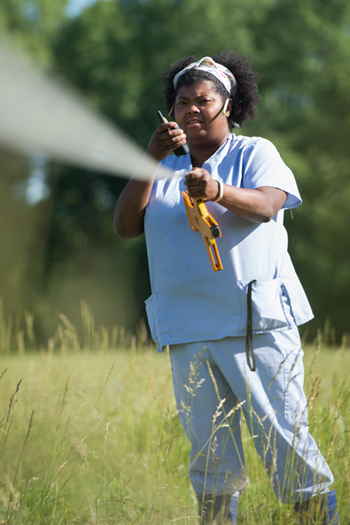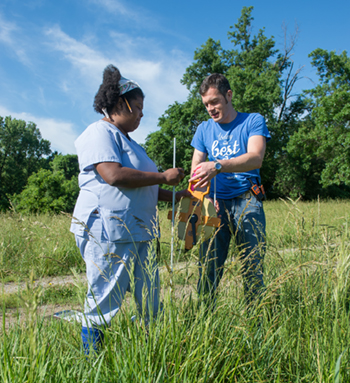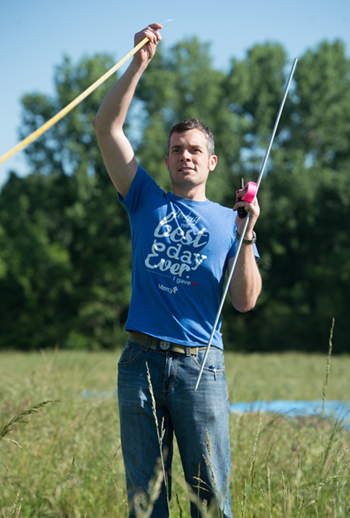 Southern Illinois University Edwardsville’s Danielle Lee, PhD, a visiting assistant professor in the College of Arts and Sciences’ (CAS) Department of Biological Sciences, has been tabbed among 14 “world-changers” by the National Geographic Society.
Southern Illinois University Edwardsville’s Danielle Lee, PhD, a visiting assistant professor in the College of Arts and Sciences’ (CAS) Department of Biological Sciences, has been tabbed among 14 “world-changers” by the National Geographic Society.
She has been named to its 2017 class of Emerging Explorers comprised of “uniquely gifted and inspiring scientists, conservationists, storytellers and innovators who are changing the world.” As an emerging explorer, Lee will receive $10,000 for her research.
“I was in complete shock upon hearing of this incredible acknowledgement,” said Lee. “This means the opportunity to talk about my research on a grander scale. It boosts the credibility of my science activism and offers an international platform to demonstrate the importance of natural history in the sciences.
“We’re entering this new age of science research where we’re focusing on applied answers and how we address the world’s greatest problems. We think about biomed, translation, etc., and all of that is amazing, but none of that applied information can be used if you don’t understand the basic systems.”
Lee is a mammologist, who studies animal behavior. National Geographic’s designation supports her research on the “behavior and biology of wild rodents, such as landmine sniffing African Giant Pouched Rats, to better understand how we can use them to save lives.” She has conducted this research in Tanzania.
“The African Giant Pouched Rat can be successfully trained to detect land minds, as well as tuberculosis,” she explained. “They are biodetectors. We can take advantage of their natural biology, which is that they’re good smellers and they’re trainable.”
 Along with this ongoing research focus, she is uniquely interested in the study of rodents’ behavior and ecology across urban gradients. She will use SIUE’s expansive landscape to conduct field research focused on field mice.
Along with this ongoing research focus, she is uniquely interested in the study of rodents’ behavior and ecology across urban gradients. She will use SIUE’s expansive landscape to conduct field research focused on field mice.
“I am interested in how these animals have consistently lived in close consort with us,” Lee explained. “We’re becoming more urbanized. So, given this increase in urbanization, how do they respond to us as things continuously change on our end? What makes them so successful across time and place and geography?”
Lee’s international recognition and “world-changer” status fits perfectly with the mission of SIUE to “develop professionals, scholars and leaders who shape a changing world.”
She is a strong proponent of the teacher-scholar model. This summer, an SIUE graduate student and undergraduates will have the opportunity to volunteer to assist in her field research on campus.
“We’ll be setting up research plots and doing a traditional capture, mark, recapture study where we’ll live trap animals and identify which species call SIUE home,” she said. “We’ll get an overall assessment of the different species’ community health, including their weight, sex, condition and species. Then we’ll return them. We’re not keeping any.”
 By summer’s end, Lee hopes to begin conducting pilot behavior tests on-site. This will involve capturing the animals, keeping them for about an hour to do testing and then releasing them again.
By summer’s end, Lee hopes to begin conducting pilot behavior tests on-site. This will involve capturing the animals, keeping them for about an hour to do testing and then releasing them again.
“Science is a verb,” she said. “Being a part of the ecology, evolution and environmental programs in the Department of Biological Sciences means I can give students a hands-on opportunity to not only learn the concepts and gain a fundamental understanding of the scientific method, but also apply them. That’s why the act of scholarship of undergraduates is so important.”
The researcher emphasizes that she is ministering to her former self, the young girl who was curious about animals and science. She aspires to foster that passion in others and help them find their “on ramp” into the sciences.
“I seem to have the personality for working with students during their formative stages,” Lee said. “I offer them opportunities to work by assisting me. In the process of helping with my research, if they find passion and excitement, and they want to do their own project within it, I help them cultivate that after they’ve learned the basic skills.”
“Animal behavior is a gateway science,” she added. “How we interact with students at an early level matters. It matters how we equip them with the formative skills they need to retain in the sciences.”
Lee plans to use her $10,000 award from the National Geographic Society to travel back to Tanzania next summer to continue her research on the African Giant Pouched Rats. Along with forwarding her work, she plans to scout opportunities for SIUE students to travel with her in the future.
“Particularly, a strength of the Department of Biological Sciences is supporting students who are interested in wildlife,” she said. “An opportunity to learn and apply their skills, and experience wildlife/human interactions in a different ecosystem and cultural context would be an extremely valuable experience for our students.”
Photo: Danielle Lee, PhD, visiting assistant professor in the SIUE College of Arts and Sciences’ (CAS) Department of Biological Sciences, conducts field research.
Dr. Lee and Dorsey native Shawn Stumph, a senior majoring in biological sciences, set up research plots on campus.
SIUE undergraduate Shawn Stumph helps Dr. Lee measure and mark research plots.